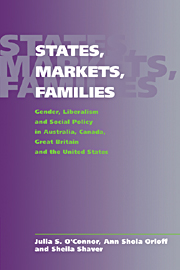 States, Markets, Families
States, Markets, Families Book contents
- Frontmatter
- Contents
- List of Tables
- Acknowledgements
- 1 Gendering Theories and Comparisons of Welfare States
- 2 Liberalism, Gender and Social Policy
- 3 The Labour Market and Social Policy
- 4 Social Rights Versus Gender Stratification and Gender Power?
- 5 Body Rights, Social Rights and Reproductive Choice
- 6 Liberalism, Gendered Policy Logics and Mobilisation
- 7 States, Markets, Families
- References
- Index
6 - Liberalism, Gendered Policy Logics and Mobilisation
Published online by Cambridge University Press: 27 October 2009
- Frontmatter
- Contents
- List of Tables
- Acknowledgements
- 1 Gendering Theories and Comparisons of Welfare States
- 2 Liberalism, Gender and Social Policy
- 3 The Labour Market and Social Policy
- 4 Social Rights Versus Gender Stratification and Gender Power?
- 5 Body Rights, Social Rights and Reproductive Choice
- 6 Liberalism, Gendered Policy Logics and Mobilisation
- 7 States, Markets, Families
- References
- Index
Summary
In this chapter we shift from analysis of single policy areas to overarching policy logic. The distinctive character of the gendered policy logic in each of the four countries is outlined around three sets of dimensions which reflect the gender reasoning underlying policy. We explain the particular patterns identified through a review of how gender equality issues have been represented in the political system since 1970. This entails considering the influence on policy development relating to gender equality of political party configuration, labour mobilisation and the strength and strategy of the women's movement. But these influences are not operating in a vacuum. In the United States, Canada, Great Britain and Australia they are operating within the context of a liberal political tradition and policy legacy which likely influences the character of political discourse in distinctive ways; for example, we would not expect left politics in these countries to find identical expression to that of social democracy in the Nordic countries. On the other hand, we would expect that differences in dominant party orientation, the level and character of labour mobilisation and the strength of the women's movement would be associated with crossnational variation in the expression and influence of the liberal political tradition on contemporary policy.
While social policy frameworks have identifiable structures we recognise that these are rarely static and that at some periods they are in considerable flux or even crisis. The 1980s and early 1990s witnessed considerable questioning of the post-World War II settlement.
- Type
- Chapter
- Information
- States, Markets, FamiliesGender, Liberalism and Social Policy in Australia, Canada, Great Britain and the United States, pp. 186 - 222Publisher: Cambridge University PressPrint publication year: 1999
